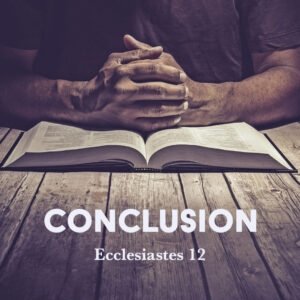Ecclesiastes 12: Conclusion
October 15, 2022
TODAY'S BIBLE READING:
Jeremiah 39-43, Ecclesiastes 12, John 5:1-15, 1 Peter 1:17-25
Finally, we come to the “conclusion” of the matter. Remember the “teacher” of Ecclesiastes has been conducting an experiment. His hypothesis has been that life “under the sun”—that is, without reference to confidence about eternity or an intimacy of relationship with God—is meaningless. Whatever you do, whether it is work or pleasure or anything else, wisdom or foolishness is all meaningless “under the sun.” Now what is his conclusion to his experiment?
First, up until verse 8, the “teacher” scans his eye over the life journey of a human being. He urges us to listen to his words and to learn from them before it is too late, to remember your Creator while you are still young. In this poem to old age there are stunning images—the grinders cease because they are few (“teeth”), the almond tree blossoms (“white hair”)—all which bespeak the trials of old age. And the lesson of this part, therefore, is to pay heed to his teaching while we still have the energy and the time to do so; that is, to remember your Creator when you are young.
But what does it mean to remember your Creator? That conclusion to the whole book then comes from verse 9 to the end of this final chapter of Ecclesiastes. The answer is simply this: “Fear God and keep his commandments, for this is the duty of all mankind.” In other words, given that life “under the sun” is meaningless, the logical conclusion is to live our lives now with reference to, obedience of, and fear of God himself—that is, as it were, to live “above the sun.”
What then should we conclude from this study? We should pray that God would undeceive us about the attractiveness and goodness of sin, of illicit entertainment, of worldly success and fame. These things are all meaningless. We should pray instead that God would give us a passion for Him, understanding that he is good and at his right hand are pleasures forevermore. And therefore, we should aim to live our lives in fear of God and in obedience of his commandments.
ABOUT THE AUTHOR
Josh Moody (Ph.D., University of Cambridge) is the senior pastor of College Church in Wheaton, IL., president and founder of God Centered Life Ministries, and author of several books including How the Bible Can Change Your Life and John 1-12 For You.
WANT MORE?
To receive God Centered Life devotionals directly in your inbox, as well as other resources, enter your email address in the form at the bottom of this page and click "subscribe."


